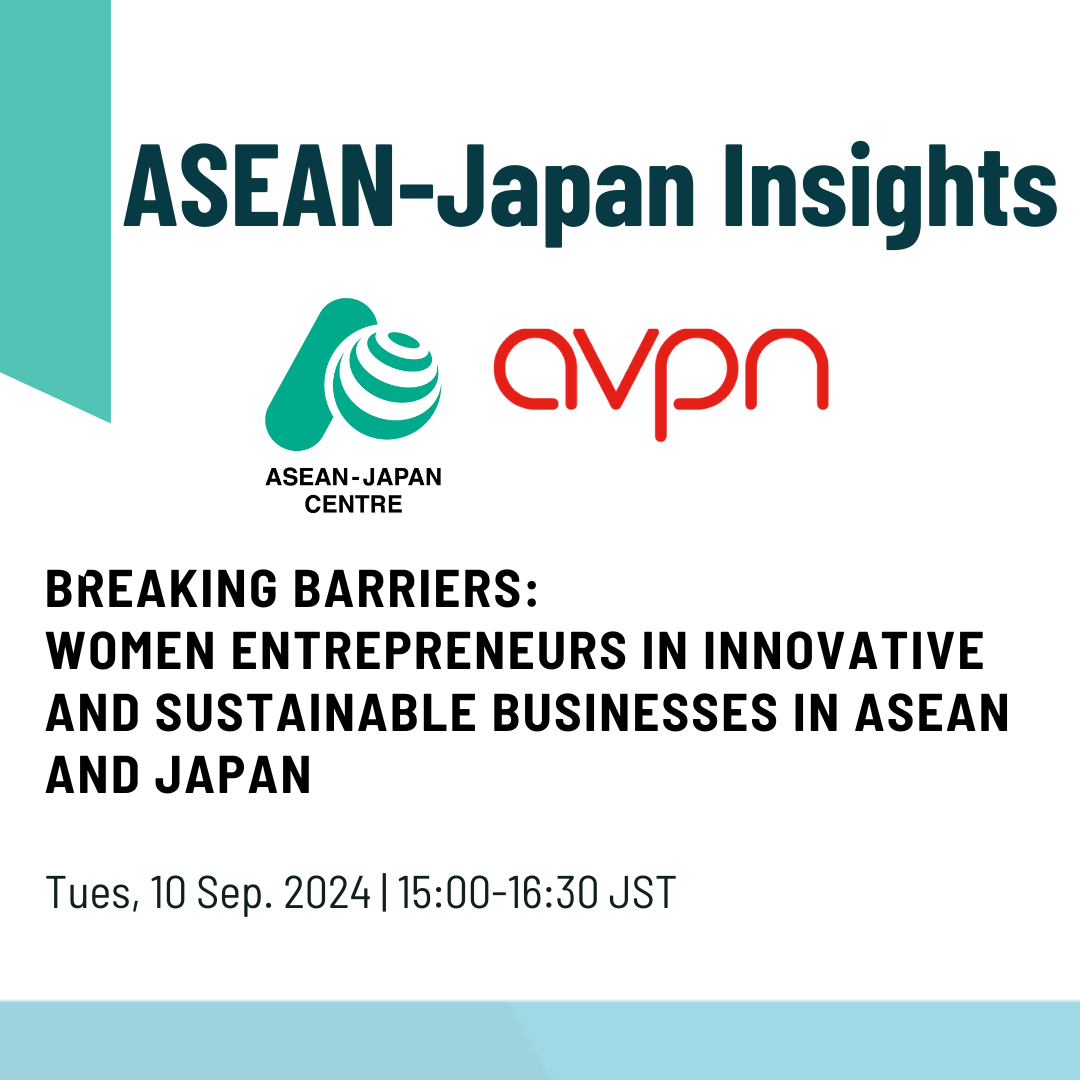The full recording of the webinar is available on YouTube. (https://www.youtube.com/live/JJttbTybQ_M)
Overview:
The webinar titled “ASEAN-Japan Insights Series: Breaking Barriers: Women Entrepreneurs in Innovative & Sustainable Businesses in ASEAN & Japan” was co-organized by the ASEAN-Japan Centre and AVPN, a leading social network investor across 33 markets in Asia on 10 September 2024. This event aimed to explore the challenges and opportunities faced by women entrepreneurs in the ASEAN region and Japan.
ASEAN-Japan Centre Secretary General delivered the Opening Remarks and highlighted the important role of women entrepreneurs in driving economic development in ASEAN and Japan. AVPN Tokyo Senior Manager Kei Eriksen emphasized women entrepreneurs’ contributions in social innovation in her Welcome Remarks.
The following speakers presented on the following topics:
- Special Talk on Women’s Participation in Tech by Oranuch Lerdsuwankij, Co-founder and CEO of Techsauce (click here to download the presentation file)
- Presentation on Gender Diversity Challenges by Kozue Sawame, President of JWLI (Japanese Women’s Leadership Initiative) and Fish Family Foundation (click here to download the presentation file)
- Panel Discussion:
Moderator: Agnes Surry, Deputy Head of Capacity Building and Training and Senior Economist at Asian Development Bank Institute
Panelists:
- Oranuch Lerdsuwankij, Co-founder and CEO of Techsauce
- Kozue Sawame, President of JWLI (Japanese Women’s Leadership Initiative) and Fish Family Foundation
- Amor Maclang, Ph.D., Co-Founder of International Digital Economies Association (iDEA) and Digital Pilipinas (click here to download the presentation file)
- Katrina Inandia, Head of Impact and Sustainability at Amartha (click here to download the presentation file)
Key Takeaways:
1. Catalysts for Innovation
In ASEAN, women have long been key drivers of innovation, and their contributions are becoming even more critical in today’s technology-driven world. Women-led startups are not only competing with but outperforming their male counterparts in several key metrics. According to a Bio-Circular-Green (BCG) study highlighted by Oranuch Lerdsuwankij of Techsauce, startups in Thailand founded by women generate significantly higher revenue, producing $730,000 in five-year cumulative revenue, compared to $662,000 from those founded by men. This showcases how women bring unique insights and fresh perspectives to the table, helping to create more viable, customer-centric solutions.
2. Challenges and Funding Gaps
Women-led businesses are on the rise, but significant disparities remain across ASEAN countries. Women-led startups receive less than half the investment compared to those led by men. This funding gap not only reflects unequal opportunities but also represents a missed opportunity for growth and innovation within the tech ecosystem. A key highlight from the panel discussion was the growing involvement of women in fintech and microfinance, as evidenced by Katrina Anandia’s presentation on Amartha, a microfinance company based in Indonesia. Since its establishment in 2010, Amartha has evolved from a village-based initiative focused on integrating Environmental, Social, and Governance (ESG) factors into its operations to serving over 2 million customers, predominantly women. This growth underscores the importance of accessible technology in empowering small business owners and demonstrates how women-led businesses can drive innovation while promoting sustainable economic development.
3. Human-Centric Innovation
Innovation is not solely about technological advancements but also involves creating sustainable business models. Women excel in developing solutions that focus on human-centric approaches, understanding customer needs, and addressing societal challenges. These solutions have a significant social impact, addressing issues such as poverty, climate change, and sustainable development. For instance, women-led initiatives in Thailand, including hackathons and accelerator programs, are reshaping the tech landscape by encouraging more women to take on leadership roles. Additionally, programs like Google’s Women initiative provide essential digital skills, which help women scale their businesses and have led to a 32% increase in digital marketing skills among women-led enterprises.
4. Current Gender Diversity Landscape in Japan
Japan’s gender gap remains significant, with the country ranking 118th out of 146, consistently among the bottom 20 for the past decade in the World Economic Forum’s global gender gap rankings. Issues such as high fear of failure among Japanese women and a lack of women in corporate and government leadership roles further complicate the landscape. Kozue Salame of JWLI highlighted these issues, noting that over 52% of women entrepreneurs in Japan have experienced sexual harassment, often from influential figures such as investors and venture capitalists. Despite these challenges, initiatives like the Japanese Women’s Leadership Initiative (JWLI) are making strides. JWLI has graduated 200 women entrepreneurs, ranging from 20 to 82 years old, who are driving innovation and change in Japan.
5. ASEAN’s Digital Majority
Despite ASEAN’s impressive adoption of nascent technologies, particularly in countries like the Philippines and Vietnam, significant challenges persist. One major hurdle is access to credit for women entrepreneurs, which remains a barrier to scaling their ventures. Amor Maclang highlighted that although women’s contributions to entrepreneurship are increasingly recognized, the persistent inequality in financial resources continues to stifle their full potential. To combat these disparities, initiatives such as Digital Filipinas, co-founded by Amor, are playing a pivotal role in empowering women within the digital economy. These programs not only address financial inclusion but also cultivate a supportive ecosystem that enables women to excel in leadership roles in the tech industry. Notably, 80% of women using e-commerce platforms report a 20% increase in revenues, and 56% of women in ASEAN have adopted digital payments, resulting in a 30% boost in transactions.
Discussion Points
- Empathy and Innovation: The role of women in driving innovation with empathy and understanding of societal needs was emphasized as a crucial factor for success and sustainability in business.
- Support Ecosystems: Creating supportive communities and networks for women entrepreneurs was identified as essential for fostering innovation and overcoming systemic challenges.
- Diverse Leadership: The need for diverse leadership and inclusive environments in both the tech industry and broader entrepreneurial ecosystems was underscored as a key driver for progress.
In summary, embracing gender diversity not only drives innovation but also creates more opportunities and productivity. The panel concluded with a call to action to support and promote women entrepreneurs by building environments that encourage the inclusion of women, leading to a more dynamic and inclusive ecosystem.
About the ASEAN-Japan Insights Series:
The ASEAN-Japan Insights Series serves as a prominent information-sharing platform focusing on ASEAN-Japan matters. This bilingual (English and Japanese) series features hybrid webinars addressing current topics relevant to both regions. It aims to facilitate knowledge exchange and foster collaboration among industry professionals, academics, governments, and enterprises.
For more information or to get involved in future webinars, please contact the Research and Policy Advocacy Cluster at info_rpa@asean.or.jp.



